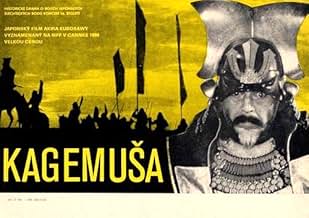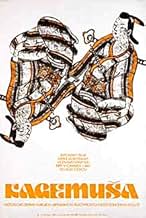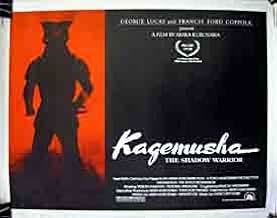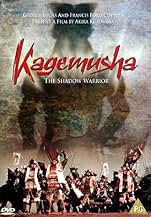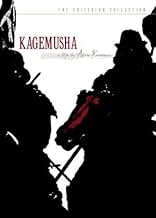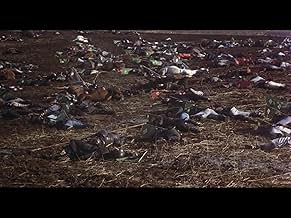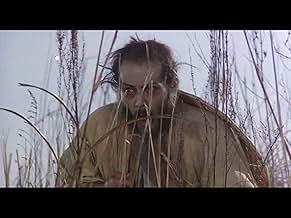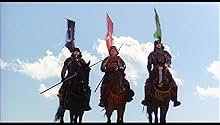A petty thief with an utter resemblance to a samurai warlord is hired as the lord's double. When the warlord later dies the thief is forced to take up arms in his place.A petty thief with an utter resemblance to a samurai warlord is hired as the lord's double. When the warlord later dies the thief is forced to take up arms in his place.A petty thief with an utter resemblance to a samurai warlord is hired as the lord's double. When the warlord later dies the thief is forced to take up arms in his place.
- Director
- Writers
- Stars
- Nominated for 2 Oscars
- 20 wins & 5 nominations total
- Director
- Writers
- All cast & crew
- Production, box office & more at IMDbPro
7.940.4K
1
2
3
4
5
6
7
8
9
10
Featured reviews
Akira Kurosawa Strikes Back!
After spending a decade (or so) in solitary confinement from the Japanese Film Industry Akira Kurosawa returns to make his semi-masterpiece "Kagemusha", which he called a dress-rehearsal for "Ran", made in 1985.
Kagemusha is, probably, the best example of cinematic overkill where nobody actually cares. Cinematic overkill is when someone constructs a complex multi-layered movie, stage epic-battles, introduce likeable and complex characters without having a very complicated message. The message of "Kagemusha" is simply this: If you pretend long enough to be something else you'll become it. Too simple, maybe, for what's delivered.
Not that "Kagemusha" is a bad movie. It's haunting, it's spectacular and it's just great. I keep thinking about it over and over. I can't get it out of my head. Simply put "Kagemusha" is a masterpiece, albeit one up for debate. Not all Kurosawa fans would like it, but that's they're business. Personally, this is one of the movies currently that I'd really like to see again.
PS: Thank goodness for George Lucas and Francis Ford Copolla who funded this movie.
Kagemusha is, probably, the best example of cinematic overkill where nobody actually cares. Cinematic overkill is when someone constructs a complex multi-layered movie, stage epic-battles, introduce likeable and complex characters without having a very complicated message. The message of "Kagemusha" is simply this: If you pretend long enough to be something else you'll become it. Too simple, maybe, for what's delivered.
Not that "Kagemusha" is a bad movie. It's haunting, it's spectacular and it's just great. I keep thinking about it over and over. I can't get it out of my head. Simply put "Kagemusha" is a masterpiece, albeit one up for debate. Not all Kurosawa fans would like it, but that's they're business. Personally, this is one of the movies currently that I'd really like to see again.
PS: Thank goodness for George Lucas and Francis Ford Copolla who funded this movie.
8ccwf
some knowledge of Japanese history is useful in appreciating this film
This film is set at the beginning of the Warring States era of Japanese history, which most Japanese film viewers would have studied extensively in school. Unfortunately for Western viewers, these historical aspects are therefore given little exposition, making some aspects of the film hard to follow for those without such schooling.
Here are some attempts at "liner notes" to help in understanding and appreciating the film (warning: I'm not Japanese and have not had Japanese schooling):
* Shingen Takeda is a warlord vying for power with Oda Nobunaga and his ally Ieyasu.
* Takeda had a reputation for the military prowess of their cavalry. Thus, you see lots and lots of horses featured in the film. Horses were important to the clan. Takeda's symbol is the four diamonds (the exact symbolism is explained in the film). Just as in the West, use of such heraldic symbols in war banners and clothing was very useful in figuring out who is who. So, keep in mind that when you see the four diamonds, whatever their color, those are Takeda forces.
* Nobunaga was known for his adoption of many Western ways. This is why he wears European-influenced clothing and doesn't have the standard samurai haircut (basically, shaved head, topknot). Nobunaga was also known for his use of rifles in battles. So, one of the themes of the film is the struggle of tradition against the influence of the West (in the film, mostly shown through the use of guns although their is also a brief shot of some clerics). Nobunaga's symbol is the five-sectioned flower. Nobunaga is also known for his love of Noh dramas, a dramatic form incorporating difficult-to-understand archaic language and restrained, careful action, somewhat like the film "Kagemusha" itself. Nobunaga launches into a bit of Noh at one point in the film.
* At this early time, Ieyasu was mostly known for his political survival skills. Ieyasu is probably best known to American viewers as the basis for James Clavell's Toranaga character in "Shogun". (Nobunaga is also in "Shogun" albeit as a minor character and under a different name.) The events in this film take place roughly two decades prior to those in "Shogun".
* Takeda's generals each also have their own symbols to help you track them. One of Ieyasu's generals also has a "symbol" (actually, the character "hon", which IMDb will not display).
* Haircuts are a sign of rank. This is why all the lords (except Nobunaga) have a certain haircut, all the pages have the same hairstyle, and so forth. The haircut~rank connection figures even more strongly and explicitly in Kurosawa's "Throne of Blood".
* Japanese men during this period often changed their names as their status changed. For example, in "Toshie to Matsu", Toshie, who is one of Nobunaga's (and, later, Hideyoshi's and Ieyasu's) generals/lords is granted the honor of changing his name to one which incorporates part of his lord's name into his own. Keep this in mind as Takeda's son discusses the use of his father's name and symbol.
* Miltary success and bravery in battle were key means of advancement. Thus, military leaders of this time are often depicted as ever-volunteering to do brave (even stupidly brave) things in hopes of gaining greater status. In "Kagemusha", Takeda's son is desperate for such advancement.
Here are some attempts at "liner notes" to help in understanding and appreciating the film (warning: I'm not Japanese and have not had Japanese schooling):
* Shingen Takeda is a warlord vying for power with Oda Nobunaga and his ally Ieyasu.
* Takeda had a reputation for the military prowess of their cavalry. Thus, you see lots and lots of horses featured in the film. Horses were important to the clan. Takeda's symbol is the four diamonds (the exact symbolism is explained in the film). Just as in the West, use of such heraldic symbols in war banners and clothing was very useful in figuring out who is who. So, keep in mind that when you see the four diamonds, whatever their color, those are Takeda forces.
* Nobunaga was known for his adoption of many Western ways. This is why he wears European-influenced clothing and doesn't have the standard samurai haircut (basically, shaved head, topknot). Nobunaga was also known for his use of rifles in battles. So, one of the themes of the film is the struggle of tradition against the influence of the West (in the film, mostly shown through the use of guns although their is also a brief shot of some clerics). Nobunaga's symbol is the five-sectioned flower. Nobunaga is also known for his love of Noh dramas, a dramatic form incorporating difficult-to-understand archaic language and restrained, careful action, somewhat like the film "Kagemusha" itself. Nobunaga launches into a bit of Noh at one point in the film.
* At this early time, Ieyasu was mostly known for his political survival skills. Ieyasu is probably best known to American viewers as the basis for James Clavell's Toranaga character in "Shogun". (Nobunaga is also in "Shogun" albeit as a minor character and under a different name.) The events in this film take place roughly two decades prior to those in "Shogun".
* Takeda's generals each also have their own symbols to help you track them. One of Ieyasu's generals also has a "symbol" (actually, the character "hon", which IMDb will not display).
* Haircuts are a sign of rank. This is why all the lords (except Nobunaga) have a certain haircut, all the pages have the same hairstyle, and so forth. The haircut~rank connection figures even more strongly and explicitly in Kurosawa's "Throne of Blood".
* Japanese men during this period often changed their names as their status changed. For example, in "Toshie to Matsu", Toshie, who is one of Nobunaga's (and, later, Hideyoshi's and Ieyasu's) generals/lords is granted the honor of changing his name to one which incorporates part of his lord's name into his own. Keep this in mind as Takeda's son discusses the use of his father's name and symbol.
* Miltary success and bravery in battle were key means of advancement. Thus, military leaders of this time are often depicted as ever-volunteering to do brave (even stupidly brave) things in hopes of gaining greater status. In "Kagemusha", Takeda's son is desperate for such advancement.
One of the best serious samurai-movies
This film is one of Kurosawa's masterpieces and gives an profound insight in the pre-Tokugawa period of Japan. Especially remarkable is the very elaborated atmosphere of this film to which contribute the pure and simple dialogues and the use of very well-made sceneries. Kurosawa's favorite actor Tatsuya Nakadai is here at his best. Although the atmosphere is very elaborated and almost perfectly historic; tension of the viewer is heightened by the simplicity of the scenes. Kurosawa leaves certain parts to the viewer's imagination rather than showing it. The movie is highly philosophical as well as emotionally touching and presents the soul of the way of samurai and Japan's old samurai system much better and more serious than countless cheap- and bad-made martial arts movies about samurai. This is a warning to all who expect fast martial arts action and blood covered katana. This film is a Kurosawa-style mixture between opulent costume- drama, a philosophic and tragic story and the sensitivity only Kurosawa has displaying Japan's traditional way-of-life.
A grand spectacle of samurais and shoguns.
What happens to the doppelganger when the original dies? Does he flitter out of existence or does he find his own. Kagemusha (shadow warrior in Japanese) is the story of a thief who is to be hanged, but is saved by a warlord's brother, Katsuyori Takeda, because of a peculiar resemblance to the king Shingen Takeda. Tatsuya Nakadai brilliantly plays both roles of Shingen and the thief. The thief is trained to fill in as Shingen's double, a position previously played by his brother Katsuyori. Shingen receives a mortal wound during a siege and the Takeda Clan retreat. His dying wish is that he wants his death not to be known for at least three years. Kagemusha eventually acquiesces to the role of not just doubling for the king, but being a figurehead twenty-four hours a day.
The intimate circle of Shingen's family and guard knows about the double. They advise him about how to be like Shingen. He plays the part well. Shingen's son Nobukado, who knows that he is the double, is convinced that his father did this to spite him. Nobukado was passed over as king and that position was granted to Shingen's grandson and Nobukado's son Takemaru as soon as he reaches of mature age. Later in the film, we realize that Shingen did this because Nobukado is too aggressive and is not leader material, not to spite him. The backing of Kagemusha helped Nobukado's one great military victory. Nobukado would forever be in Shingen's shadow.
The relationships between the thief and the Lord's men make this a fascinating film. There is a rich tapestry of multidimensional characters. To some critics the action was too slow. It was not as fast paced as The Seven Samurai or Yojimbo. I think it is a mature film from a maturing director who would go on to direct another of my favorite films Ran. This film was nominated for two academy awards and would co-win the grand prize at the Cannes Film Festival. The juxtaposition between the titanic and minute is a favorite concept of Kurosawa. Stolid men have tragic faults. Beggars can be kings.
Kurosawa is one of the world's most famous directors. Yet in the 1980's, he did not get much respect from his home country Japan. He had not had released a film since 1975 -- the beautiful and brilliant Dersu Uzala and he was reportedly suicidal. This film would not have been made if it were not for George Lucas and Francis Ford Coppola whom helped finance this film. Lucas has always been a big fan of Kurosawa. Star Wars was partially influenced by Kurosawa's film The Hidden Fortress. I am a big fan of Kurosawa too. His films always have the most beautiful cinematography, intricate plots and grand characters. Kagemusha is no exception.
The intimate circle of Shingen's family and guard knows about the double. They advise him about how to be like Shingen. He plays the part well. Shingen's son Nobukado, who knows that he is the double, is convinced that his father did this to spite him. Nobukado was passed over as king and that position was granted to Shingen's grandson and Nobukado's son Takemaru as soon as he reaches of mature age. Later in the film, we realize that Shingen did this because Nobukado is too aggressive and is not leader material, not to spite him. The backing of Kagemusha helped Nobukado's one great military victory. Nobukado would forever be in Shingen's shadow.
The relationships between the thief and the Lord's men make this a fascinating film. There is a rich tapestry of multidimensional characters. To some critics the action was too slow. It was not as fast paced as The Seven Samurai or Yojimbo. I think it is a mature film from a maturing director who would go on to direct another of my favorite films Ran. This film was nominated for two academy awards and would co-win the grand prize at the Cannes Film Festival. The juxtaposition between the titanic and minute is a favorite concept of Kurosawa. Stolid men have tragic faults. Beggars can be kings.
Kurosawa is one of the world's most famous directors. Yet in the 1980's, he did not get much respect from his home country Japan. He had not had released a film since 1975 -- the beautiful and brilliant Dersu Uzala and he was reportedly suicidal. This film would not have been made if it were not for George Lucas and Francis Ford Coppola whom helped finance this film. Lucas has always been a big fan of Kurosawa. Star Wars was partially influenced by Kurosawa's film The Hidden Fortress. I am a big fan of Kurosawa too. His films always have the most beautiful cinematography, intricate plots and grand characters. Kagemusha is no exception.
10Hitchcoc
Another Brilliant Epic
This is a great epic of war and a film of great emotion. At the center is a man who has nothing. He is thrust into a world he didn't create. He is a petty thief and really would like to just get on with his life. What he also has is great loyalty to his now deceased lord, and despite his great concern for his ability to carry it off, he agrees to the position. He has to know that at some point this will all come crashing down. The Samurai code makes it so that he has few options. He runs the war the best he can but occasionally falls victim to who he is. Even with advisers watching his every move, he becomes so much a part of the entire picture that he is left to destroy himself, and, in the process, the clan that he represents. The battle scenes are remindful of the other huge films like "Ran" and "Throne of Blood." They sweep across the screen with the flag carrying horsemen and the infantry fighting until there is nothing left but total carnage. Because of the complexity of the story and the wonderful acting, I would put this at or near the top of my Kurosawa list.
Did you know
- TriviaMuch of the film recounts actual historical events, including Shingen's death and the two-year secret, and the climactic Battle of Nagashino in 1575. Those scenes are also modeled closely on detailed accounts of the battle.
- GoofsIn the final battle there are at least 100 riflemen shown firing their matchlock rifles in volleys. The smoke generated by the matchlocks almost immediately dissipates. This indicates a more modern gunpowder was used in the matchlocks as the historically correct black powder load would blanket the battlefield with thick smoke after a handful of volleys.
- Quotes
Nobukado Takeda: The shadow of a man can never stand up and walk on its own.
- Alternate versionsIn the original Japanese version, there are 20 minutes featuring Kenshin Uesugi. For some reason, these scenes were cut out of the USA version.
- ConnectionsFeatured in A.K. (1985)
Details
- Release date
- Countries of origin
- Language
- Also known as
- Kagemusha, sjena jena ratnika
- Filming locations
- Himeji Castle, Himeji, Japan(Nobunaga's castle)
- Production companies
- See more company credits at IMDbPro
Box office
- Budget
- $6,000,000 (estimated)
- Gross US & Canada
- $4,000,000
- Gross worldwide
- $4,018,532
- Runtime
- 2h 42m(162 min)
- Color
- Sound mix
- 4-Track Stereo(original version)
- Aspect ratio
- 1.85 : 1
Contribute to this page
Suggest an edit or add missing content


